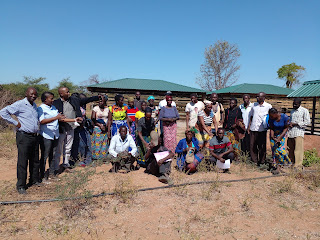By HAPPY MULOLANI
Despite Zambia being
endowed with abundant arable land, the majority of farmers still grapple to
irrigate their crops as they are still dependent on rainfed agriculture. This
situation has provided an opportunity for the country to promote irrigation farming
in order to increase production and incomes of smallholder farmers which is in
tandem with the Eighth National Development Plan (8NDP).
Government’s approach has
been to closely work with the private sector to ensure smallholder farmers
transition from rainfed agriculture to irrigation farming through accessing
affordable technologies. This approach has given impetus to the private sector
such as KickStart to promote affordable technologies to smallholders.
Kick Start-International
is a non-profit Social Enterprise which aims at enabling millions of
smallholder farmers in Africa to earn a high income through promoting low-cost
irrigation pumps across Sub-Sahara Africa since 2000.
The organisation started
its operations in Kenya and rolled out to 17 countries in Africa. According to the
KickStart Fact Sheet, “KickStart has sold over 370,000 low-cost, moneymaker
branded, manual irrigation pumps, and partnered with hundreds of NGOs and UN
agencies, private sector companies, importers and retailers to reach and
educate farmers, and promote the uptake of smallholder irrigation.”
Speaking at the official
launch of KickStart International Money Maker Irrigation Starter Pump, Minister
of Agriculture Reuben Mtolo expressed concern that despite Zambia’s irrigation
being estimated to be around 3million hectares of land, less than 10 percent is
utilized by the agriculture sector.
Mr Mtolo said that these
statistics are worrisome and calls for improvement. Therefore, the active
participation of the private sector in ensuring smallholder farmers have access
to affordable irrigation pumps is a priority.
Mr Mtolo was optimistic
that the irrigation starter pump is a “practical example of the private
sector’s capacity to address the challenges smallholder farmers have been
experiencing in Zambia.”
He was overjoyed that
Zambia was among the countries to embrace the technology.
“I am delighted that
Zambia has become the fifth country to launch this product in the region. We encourage
all stakeholders to promote the use of this [technology] and other irrigation
technologies amongst our smallholders in the country,” Mr Mtolo said.
What is required by all
stakeholders is to support this technology in order to increase the cultivation
of off-season commodities and enhance income generation through promotion of
all year production at small scale level.
Working with smallholder
farmers in the provision of affordable pump technologies has enabled KickStart
to draw vital lessons. These lessons are a stepping stone to fine tune
interventions being offered.
KickStart President and
Chief Operating Officer Peter Juma, explained that there was need to forge
partnerships which will help in boosting the irrigation agenda.
Mr Juma was cognizant of
the undeveloped value chains, access to capital, input distribution and
road-network, as some of the impediments to the development process of
irrigation.
Amid these challenges,
there have been some positive impacts among farmers. For instance, Leonard
Nsabata, a farmer in Lufwanyama on the Copperbelt province, used buckets to
water his gardens of tomatoes which was really a burden as the area covered was
very small. This meant his production capacity was just for home consumption.
However, when he got introduced to the KickStart Money Maker pumps, he has been
able to increase his area under cultivation as he can irrigate larger portions
of his fields.
From the proceeds, “I
have been able to build an eight bedroomed self-contained house, purchase a
tractor and send my children to school,” Mr Nsabata said.
Peter Zulu, a farmer of Kasenengwa district of Eastern
province,
used buckets to water his tomato fields previously. However, in 2016, he
obtained a loan from Vision Fund and purchased a pump and also underwent training.
That became a turning point in his life as the production capacities improved
tremendously.
“Between 2018 -2020, I bought
four cars, a shop and will soon sponsor my children for further studies to
college,” Mr Zulu said.
He said currently a box of
tomato fetches K300 and he makes K35,000 per week. Mr Zulu grows 5,000 plants
of tomato. He intends to increase to 7,000 plants after realizing the good
profit margins.
Mary Nga’ndu, a female
farmer in Kasenengwa, recalls how she began farming six years ago with her
grandchildren. She would use buckets to water her gardens with the help of the
grandchildren.
“It was a struggle to
water my garden using buckets but ever since I got a pump through KickStart, I
now grow for both consumption and for sale,” Ms Nga’ndu said.
From the profits earned, Ms
Nga’ndu has managed to buy three goats, a bicycle and is now able to
comfortably pay school fees for the children.
From the foregoing farmer
experiences with KickStart treadle pump technology, farmers ought to adopt this
technology in order to increase their production capacities and incomes. It is
pacifying that the private sector has made drastic strides to work with
government in identifying opportunities and also ensuring that smallholder
farmers have access to affordable technologies.






